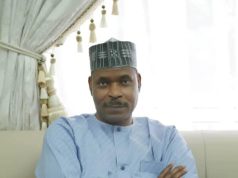The governor said the colonial masters only wanted to “actualise their interests and not for any genuine development of the country.”To Blame
Governor Abdullahi Ganduje of Kano has attributed Nigeria’s plethora of challenges to the faulty foundation laid by the country’s colonial masters.
Mr Ganduje made the assertion at the launching of N250 million Dr Abdullahi Ganduje Lecture Theatre and Award on Saturday at the University of Ibadan.
“The challenges of nation building in Nigeria are attributable to the very faulty foundation laid by the European colonial masters.
“These were purely done to actualise their interests and not for any genuine development of the country,” he said.
Mr Ganduje, who was the Guest Speaker and bagged the Most Distinguished Alumni Award, said the faulty foundation laid by the colonial masters was purely done to actualise their interests and not for any genuine development of the country.
The governor stated that Nigeria’s colonial masters divided the country into North and South without much concern for the peculiarities of the two regions.
He said that the division was without concern for the difference in land tenure systems, local government administration, education and judicial systems.
“From this historical legacy, therefore, regionalism has been a major challenge to nation-building in Nigeria. Under these conditions, it was easy for prejudice and fear to thrive,” the governor said.
Mr Ganduje said the country’s founding fathers tried to deal with the challenge by adopting federalism and advocating policy of unity-in-diversity.
According to him, the lack of consolidation of Nigerian federalism around commonly shared values and positions continue to undermine efforts at nation-building.
“This could be seen in the division between ‘indigenes’ and ‘settlers’, which has been a source of domestic tension and undermined our efforts at creating a common nationhood,” Mr Ganduje said.
He urged Nigerians not to see themselves as victims of colonial history, but be more responsible to overcome the challenges posed by the country’s history.








